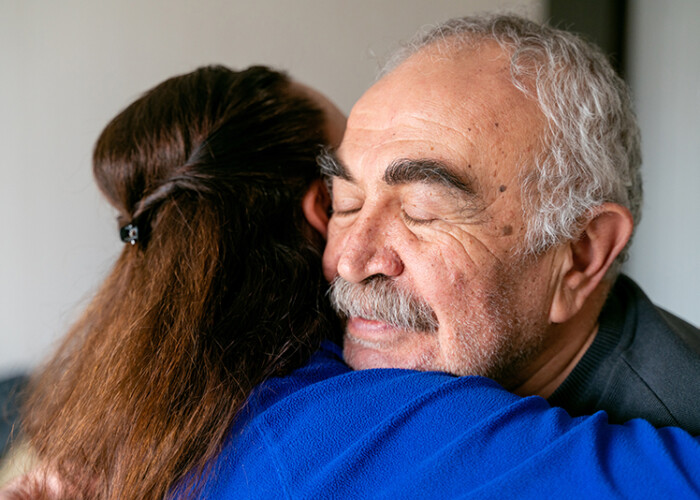Alzheimer’s
How to Be a Partner and Not a Parent as a Spousal Caregiver
We have tips to help you maintain your relationship while being a spousal caregiver.
Healthy, long-term relationships take commitment, sacrifice, and compromise. The happiest relationships are those where both parties selflessly take care of each other. This balance shifts, however, if the person you love experiences a significant health concern. And this shift can have a devastating effect on the dynamics of your relationship if you’re not vigilant, as you find yourself in the role of a spousal caregiver.
It’s natural to want to help your spouse in whatever way you can as their health needs change. However, it’s vital that you ensure you are not sacrificing your romantic connection in the process. Attempting to parent your partner can result in resentment – for both of you. To promote healthy boundaries, keep the following in mind:
• Find … Read More »
What People With Alzheimer’s Want You to Know
Improve communication with someone you love by learning what people with Alzheimer’s want you to know.
If you’ve ever wished you could look a senior with dementia in the eye and understand exactly what they’re thinking, we just might be able to help you with that! Communicating effectively with someone with dementia isn’t easy, especially as the disease progresses. Following are several statements provided by people with Alzheimer’s to give you some insight into what it feels like to live with the disease.
You haven’t lost me. A diagnosis of dementia does impact a person in many ways, but it doesn’t change the essence of who they are. “I love the same people and doing the same things I did before my diagnosis,” explains Dale Rivard. It’s essential to recognize that while memory and cognitive abilities may decline, the … Read More »
The Link Between Hearing Loss and Dementia You Need to Know About
Understanding the link between hearing loss and dementia is crucial to know the steps you can take to reduce the risk of cognitive decline.
Are you finding the need to turn the TV up louder for someone you love? Speaking more loudly? Repeating things the person missed hearing the first time? Hearing loss in older adults is not uncommon. But new scientific studies are pointing to a startling link between hearing loss and dementia.
How Hearing and Cognitive Functioning Are Linked
There are a number of hypotheses scientists are exploring to explain the connection between hearing loss and an increased risk of dementia:
The brain’s memory and thinking ability are affected when it has to work harder to strain to hear and to fill in the gaps when communication is missed.
An older brain shrinks more rapidly because of hearing … Read More »
Feeling Overloaded With Caring for a Loved One? These Tips Can Help!
If you’re feeling overloaded with caring for a loved one, we have three simple steps you can take to ease the strain.
If today’s to-dos seem like a lot more than you are able to possibly squeeze into 24 short hours, you are not alone! Family caregivers frequently are feeling overloaded with caring for a loved one and the daily required tasks: Personal care and hygiene. Planning and preparing meals. Medical appointments. Planning activities that are purposeful and enjoyable for the older adult. Shopping and other errands. Housework and laundry. And all of this is on top of meeting the requirements of your own spouse, children, household, and if there is any time left over, yourself!
We invite you to hit the pause button for just a minute, take a deep breath, and put into action these tried-and-true … Read More »
Take These Steps to Avoid Overmedication and Adverse Medication Reactions in Seniors
Taking too much or too little of a medication or taking it the wrong way can lead to adverse medication reactions in seniors.
The days of “take two aspirin and call me in the morning” have morphed into “take two of these…and two of these…and maybe one of those, too!” Nearly forty percent of seniors are taking at least five different prescription medications each day – not to mention vitamins, supplements, and OTC meds. It is easy to understand why overmedication and adverse medication reactions in seniors are extremely common.
Take these actions to avoid medication problems for someone you love:
Make a list, and check it twice. Create a list of every one of the medications – both over-the-counter and prescription – that the person is currently taking. Share the list with all of their healthcare providers, and … Read More »
Watch for These Early Signs of Mobility Problems in Older Adults
All family caregivers need to know the early signs of mobility problems in older adults in order to prevent falls or other serious injuries.
Benjamin Franklin certainly had it right: An ounce of prevention is really worth a pound of cure. When it comes to noticing and addressing the early signs of mobility problems in older adults, prevention is a must. Falls in seniors lead to 3 million emergency room visits, 300,000 hip fractures, and 32,000 deaths every year, according to research by the CDC.
Preempt a tragedy by keeping an eye out for these warning signs of increasing mobility issues in older loved ones:
Experiencing dizziness. Dizziness and issues with balance can develop from a variety of contributing factors that ultimately cause problems with mobility. It’s important to discover why these issues are taking place and address them … Read More »
The Final Stage of Alzheimer’s: What to Expect
Being prepared for the final stage of Alzheimer’s is key to continuing to help make life as meaningful as possible for someone you love.
The journey through Alzheimer’s disease can be compared to navigating a winding road that spans years, riddled with intermittent stops, starts, unexpected twists, and a plethora of unknowns. As the dedicated caregiver for an individual grappling with dementia, having foresight about what to expect around the next bend is paramount. This knowledge empowers you to not only be well-prepared but also to administer the most fitting and compassionate level of care in the final stage of Alzheimer’s.
Alzheimer’s, being a highly individualized experience, manifests uniquely in each person. Yet there are certain commonalities at every stage of the disease. When an individual transitions into the last stage, discernible challenges emerge, including struggles with eating … Read More »
Why Alzheimer’s Caregivers Say They Need to Go It Alone – And Why It’s a Bad Idea
“You can make it, but it’s easier if you don’t have to do it alone.” – Betty Ford
Alzheimer’s caregivers may feel as though they are the only ones who can provide the best care for an older loved one, but finding a care partner is vitally important.
As a family member caring for a loved one with dementia, you know firsthand how challenging it can be. It’s definitely never a role that Alzheimer’s caregivers should try to fill on their own. Yet, many caregivers struggle with seeking the support they need, intensifying stress and leaving minimal room for self-care, a vital aspect for those in caregiving roles.
See if you can relate to these top reasons given by family caregivers for attempting to provide care solo, and why they need to be reconsidered:
Dad would not want another … Read More »
3 Steps to Better Advocate for an Aging Parent
Trusting someone you love to the care of someone else is never easy, particularly for a senior family member. Whether at home or in a facility, you’ll have questions you need answered. You will also want to be ready to advocate for an aging parent to proactively address any potential problems and also to quickly take care of issues that do take place.
For instance, review the following common situations and how to most effectively advocate should they arise with an older adult you love:
The person has dementia. A loved one with Alzheimer’s might not be able to effectively communicate their wishes and needs. As an example, a new caregiver may not realize that Dad wears inserts in his shoes and she may put his shoes on each day without them. Dad may not know how to communicate this … Read More »
Reminiscing in Dementia: How to Spark Memories and Instill Joy
Memory loss and dementia may seem synonymous. Yet it’s crucial to understand that long-term memory frequently remains intact long into the progression of the disease. For this reason, tapping into those distant memories is a good way to help an older adult with Alzheimer’s stay engaged in current conversations by connecting to the past. Reminiscing in dementia can help older adults:
Better connect to others through sharing stories
Instill self-confidence by bringing to mind the numerous accomplishments they have made as well as the lives they’ve impacted
Minimize some of the adverse effects of Alzheimer’s, such as restlessness, wandering, agitation, and more
Reduce negative emotions and stress by shifting the focus to happier times
Reminiscing in dementia, also known as reminiscence therapy, doesn’t have to be elaborate. Begin by cracking open a photo album and simply looking at pictures together. Then let … Read More »

















